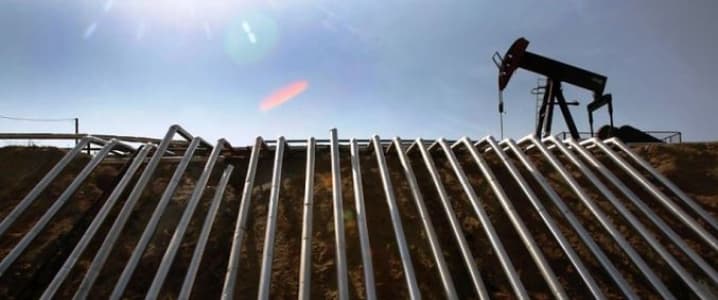Even amid a backdrop of low global commodity prices, new oil and gas discoveries are continuing to drive investment in Egypt’s hydrocarbons sector.
In late August, Shell announced that it had discovered 142 billion cubic meters of natural gas at its Alam El Shawish concession in Egypt’s Western Desert, with the possibility of more reserves to be recovered, representing one of the largest finds in the region in recent years.
This follows another discovery by the Egyptian General Petroleum Corporation last year that could yield 2.2 million barrels of oil and nearly 311.5m cubic meters of gas in the Abu Sennan area of the Western Desert, which is already responsible for nearly half of Egypt’s total oil production of 723,000 barrels per day.
New acquisitions
Egypt has one of the region’s oldest upstream sectors, although investment has been impacted by slowing commodity prices over the past five years. However, with low operating costs – at less than $10 per barrel for onshore production – and a favorable exchange rate, the country has still managed to attract new interest, with a spate of recently-announced or expected deals.
In August, UK-based Rockhopper Exploration acquired Beach Petroleum Egypt, which holds minority stakes in the Abu Sennan and El Qa'a Plain concessions, for $11.9m. The company expects that production will begin soon at a new well at Abu Sennan, boosting recoverable reserves at the field, where operating costs are as low as $8 per barrel.
Combined with the company’s existing production in Italy, the new acquisition is expected to raise Rockhopper’s output to between 1500 and 1800 barrels of oil equivalent per day (boepd) for the remainder of the year.
Additionally, the partners of the El Qa’a Plain concession – UK upstream operator Dana Petroleum (37.5 percent) and Singapore-based holding company Dover Investments (28 percent) – are currently assessing previously collected seismic data, with drilling expected to commence next year.
Rockhopper has said that it will consider further expanding its presence in Egypt in future exploration licensing rounds, according to a company statement in August.
Gas stakeholders
There are also expectations for a number of new entrants in what is shaping up to be one of Egypt’s largest upstream gas projects.
Italy’s Eni, which is behind the offshore Zohr field in the Mediterranean, has announced plans to sell a stake in the 30trn cubic feet block. The company said that several national and international oil companies have expressed interest informally and that it expects to sell a stake of around 20 percent, which could be worth anywhere between $1.6 billion and $2.2 billion, according to international press reports.
Development costs are low, as the field is close to existing infrastructure, much of which – such as the liquefied natural gas (LNG) trains in Damietta – are currently underutilized. The sale will raise cash for Eni, as well as allow a pooling of risk.
Despite the sale, Eni remains committed to Egypt. It recently raised production at its offshore Nooros gas field to 128,000 boepd ahead of schedule, just 13 months after discovery, and aims to reach maximum production capacity of around 160,000 boepd next year.
Also in August, local press reported that U.S. petroleum company Apache was planning to increase its investment in Egypt – on top of the company’s investment of more than $12 billion in 23 concession areas – including signing new exploration contracts.
Sustained domestic demand
The increase in output comes at a time when Egypt is looking to balance export commitments and rapidly-rising domestic demand.
While Egypt has historically been a hydrocarbons exporter, the country has more recently alternated between importer and exporter status. It bought more oil and related products than it sold in 2007 and then again starting in 2012.
In 2015, Egypt’s Ministry of Planning reported that 28.6m tons of crude oil, LNG, natural gas and other oil-related products were estimated to have been imported to Egypt in FY 2015/16, at a total cost of $16bn.
ADVERTISEMENT
As a result, the new finds and acquisitions should help shore up output to allow the country to meet both needs for domestic consumption and export agreements. The development of the Zohr gas field, in particular, is expected to lower Egypt’s dependence on imports of LNG.
“The country is hopeful due to its large industrial capacity,” Maurizio Coratella, vice-president of operations in Egypt and the Middle East at Edison, told OBG. “Production and exploration did not drop during the revolution, and most new wells were drilled after oil prices dropped, which illustrates real demand.”
The scaling back of Egypt’s fuel subsidies is also expected to benefit the sector in the long run by boosting margins, improving efficiency and strengthening Egypt’s macroeconomic fundamentals despite potentially slowing demand growth.
“The government has been assertive in their quest to reform subsidies and move toward a free market system for energy products. This will ultimately rationalize the demand, reduce Egypt’s budget deficit, and optimize the use of funds,” ExxonMobil Egypt chairman and managing director Hesham El Amroussy, told OBG.
More Top Reads From Oilprice.com:
- Could The Bottom Fall Out Of This Oil Rally?
- Can Oil Stay Above $50 Per Barrel?
- The Resurrection Of Putin: What It Means For The Oil Markets


















